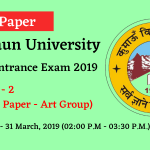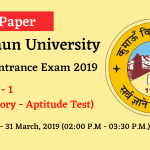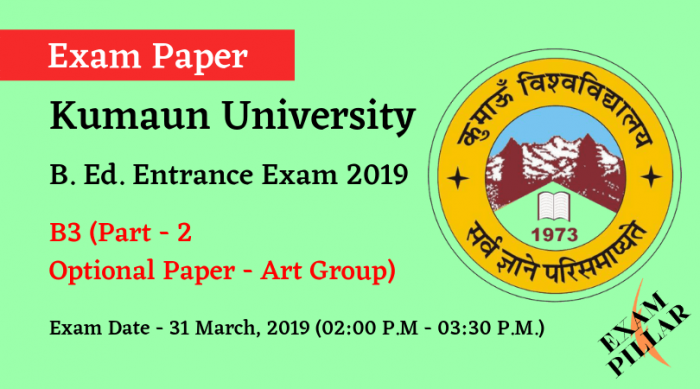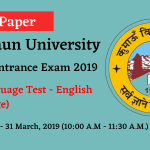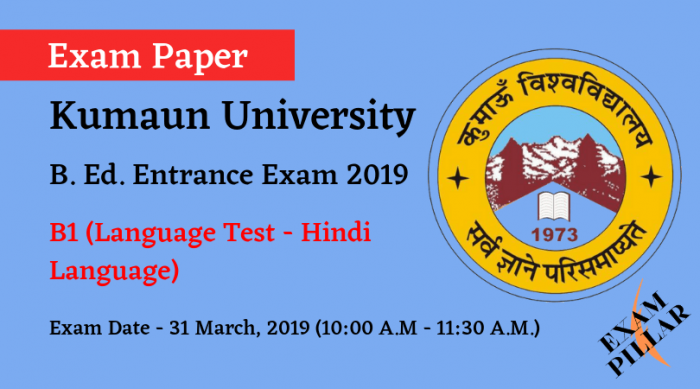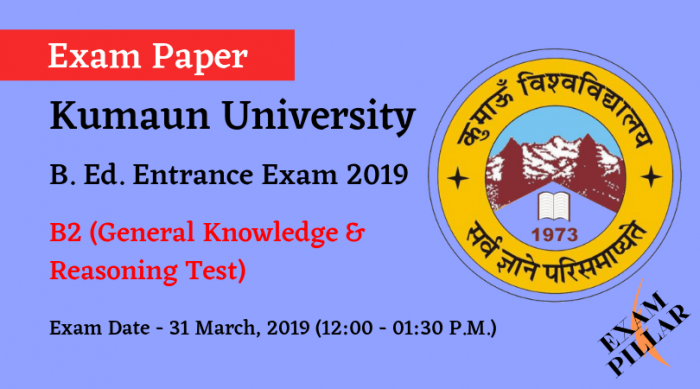कुमाऊँ विश्वविद्यालय नैनीताल (Kumaun University, Nainital) द्वारा आयोजित B. Ed. की प्रवेश परीक्षा (Entrance Exam 2019) का आयोजन दिनांक 31 मार्च 2019 को किया गया, इस परीक्षा का प्रश्नपत्र उत्तर कुंजी (Question Paper With Answer key) सहित यहाँ पर उपलब्ध है –
परीक्षा (Exam) – B. Ed. प्रवेश परीक्षा 2019
आयोजक (Organizer) – कुमाऊँ विश्वविद्यालय नैनीताल (Kumaun University, Nainital)
पेपर कोड (Paper Code) – B1 – Language Test – English Language
दिनाकं (Date) – 31 – March – 2019 (Sunday)
पाली (Shift) – 10:00 A.M. – 11:30 P.M.
Click Here To Download Official Answer Key
Click Here 👇 to Read B. Ed. Paper
- Paper Code – B1 भाषा परीक्षण – हिंदी भाषा (Language Test – English Language)
- Paper Code – B2 सामान्य ज्ञान एवं तार्किक बुद्धि परिक्षण (General Knowledge and Reasoning Test)
- Paper Code – B3 Part – 1 अनिवार्य विषय (Compulsory Paper – Aptitude Test)
- Paper Code – B3 Part – 2 वैकल्पिक विषय – कला वर्ग (Optional Paper – Art Group)
Kumaun University Nainital B. Ed. Entrance Exam 2019
Language Test – English Language
Direction (Q. Nos. 1 to 6) : Choose the correct word that closely fits the given description.
1. One who is interested in the welfare of women:
(A) Feminine
(B) Feminist
(C) Effeminate
(D) Flamboyant
Show Answer/Hide
2. A person who helps you break the law :
(A) Spy
(B) Collaborator
(C) Ally
(D) Accomplice
Show Answer/Hide
3. A person who is reserved in talks :
(A) Reticent
(B) Silent
(C) Mendicant
(D) Garrulous
Show Answer/Hide
4. One who lends money at high rate of interest :
(A) Solvent
(B) Uxorious
(C) Usurer
(D) Shylock
Show Answer/Hide
5. A small piece of wood :
(A) Splinter
(B) Crumb
(C) Scrap
(D) Chip
Show Answer/Hide
6. A field or a part of a garden where fruit trees grow :
(A) Park
(B) Nursery
(C) Yard
(D) Orchard
Show Answer/Hide
Direction (Q. Nos. 7 to 15) : Read the following passage carefully and answer the questions by choosing the correct alternative.
PASSAGE
All great thinkers live and move on a high plane of thought. It is only there they can live harmoniously and attain that serenity which comes from ideal companionship. The studies of all great thinkers must range along the highest altitudes of human thought. I cannot remember the name of any illuminative genius who did not drink his inspiration from the fountains of ancient Greek and Hebrew writers; or such among the moderns as were pupils in ancient thought, and in turn, became masters in their own. I have always thought that he strongest argument in favour of Baconian theory was that, no man, however indubitable his genius, could have written the plays and sonnets that have come down to us under Shakespeare’s name who had not the liberal education of Bacon. How this habit of intercourse with the gods makes one impatient of mere men. The magnificent ideals that have ever haunted the human mind, and given us our highest proofs of a future immortality by reason of the impossibility of their fulfillment here, are splintered into atoms by contact with life’s realities. Hence comes our sublime discontent. You will notice that your first sensation after reading a great book is one of melancholy and dissatisfaction. The ideas, sentiments, expressions, are so far beyond those of ordinary working life that you cannot turn aside from one to the other without an acute sensation and consciousness of the contrast. And the principles are so lofty, so superhuman that it is a positive pain, if once you become imbued with them, to come down and mix in the squalid surroundings of ordinary humanity. It may be spiritual or intellectual pride that is engendered on the high plane of intellectual life. But whatever it is, it becomes inevitable. A habitual meditation of the vast problems that underlie human life, and are knit into human destinies—thought of immortality, of the littleness of mere man, of the greatness of man’s soul, of the splendours of the universe that are invisible to the ordinary traffickers in the street, as the vastness of St. Peter’s is to the spider that weaves her web in a corner of the dome—these things do not fit men to understand the average human being, or tolerate with patience the sordid wretchedness of the unregenerate masses. It is easy to understand, therefore, why such thinkers fly to the solitude of their own thoughts or the silent companionship of the immortals; and if they care to present their views in prose or verse to the world, that these views take a sombre and melancholy setting from the pale cast of thought in which they were engendered.
7. On what plane must great thinkers live and move?
(A) on a high plane of thought
(B) on mundane plane
(C) on mystical plane
(D) on psychological plane
Show Answer/Hide
8. Great thinkers can live harmoniously only:
(A) ordinary, down-to-death people
(B) on a high plane of thought
(C) pedantic people
(D) monks
Show Answer/Hide
9. Most of the great souls were inspired by:
(A) ancient Indian scriptures
(B) Shakespeare
(C) St. Peter
(D) ancient Greek and Hebrew writers
Show Answer/Hide
10. Is liberal education necessary to produce great literature ?
(A) Yes
(B) No
(C) Partly necessary
(D) None of the above
Show Answer/Hide
11. What is the unique feature of great literature ?
(A) The magnificent ideals of man’s future immortality is interwoven with life’s realities
(B) Man’s immortality is seen as an impossibility
(C) Man’s immortality is possible here and now
(D) Life’s physical realities are given supremacy over life’s spiritual realities
Show Answer/Hide
12. In the context of the passage, what is meant by ‘sublime discontent’?
(A) To be spiritually unhappy
(B) Discontent which is great in magnitude
(C) Melancholy and dissatisfaction followed by lofty, superhuman pain
(D) None of the above
Show Answer/Hide
13. Why does the reading of a great book make one melancholy and disappointed ?
(A) Because the ideas, sentiments, expressions are far beyond ordinary life
(B) Because of the lofty, superhuman principles
(C) None of the above
(D) Both (A) and (B)
Show Answer/Hide
14. What are the things that make it hard to understand the average human being ?
(A) Thoughts of immortality
(B) Thoughts of littleness of mere man, and of the greatness of man’s soul
(C) Thoughts of the splendours of the universe
(D) All of the above
Show Answer/Hide
15. What do the great thinkers do when they are not understood by the common mass?
(A) They escape of jungles
(B) They become ascetics and live in ‘ashramas’
(C) They commit suicide
(D) They fly to the solitude of their own thoughts or the silent companionship of the immortals.
Show Answer/Hide
Direction (Q. Nos. 16 to 19): Find the correct meaning of the given phrasal verb.
16. Turn against :
(A) Change
(B) Stop helping
(C) Be fond of
(D) None of the above
Show Answer/Hide
17. Lay off :
(A) Minimum
(B) Stop using
(C) Not to obey the law
(D) Hungry
Show Answer/Hide
18. Knock about :
(A) Wander about
(B) Mock at
(C) Laugh loudly
(D) Very friendly
Show Answer/Hide
19. Cut down :
(A) Reduce
(B) Kill
(C) Protest
(D) Suffer
Show Answer/Hide


